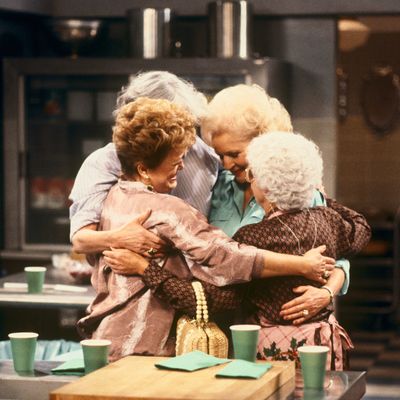
You know the old saying about blood being thicker than water? There are plenty of situations in which that’s true — but as it turns out, your health might not be one of them. When it comes to staying healthy into old age, the relationships you’ve formed with the family you choose may be more important than the relationships you have with the one you’re born into.
That’s according to a recent study by William J. Chopik, a psychologist at Michigan State University: “There is now a large body of research supporting the idea that close relationships enhance health and well-being across the lifespan,” Chopnik wrote in the study, which was published earlier this year in the journal Personal Relationships and sponsored by the National Institute on Aging. When it comes to friendships, though, the research is sparse. We know that friendships are strong predictors of other health-related factors — your friends can influence whether you’ll be happy or sad, a smoker or a drinker, fit or obese. But we don’t know how friendship in isolation, its strength and quality, affects a person’s health over their lifetime.
So Chopik conducted a set of experiments examining just that. The first focused on the link between participants’ health and how much they valued their relationships with friends and family members. The second examined similar variables with a group of elderly people, but instead of describing how much they valued their relationships, these older subjects were asked how much support they received from their friendships and family ties. The researchers also asked participants how much strain each of these two kinds of relationships contributed to their lives.
Overall, both studies found the conventional wisdom to be at least partly true: People who valued their family relationships overall were happier and in better health than those who didn’t, a finding that stayed constant throughout life. The value of friendship, however, had an increasing return — the older the participants were, the more important a role their friendships played in keeping them sane and healthy. This was especially true when looking at the development of age-related chronic illnesses: the quality of friendships was an important predictor of whether or not someone would acquire a chronic illness as they got older, whereas the quality of family relationships was not (though it did predict one’s subjective well-being).
Why does this happen? One possible reason, Chopik writes, is that we get to choose our friends, and as we get older, we choose more wisely. Although our social networks shrink with age, he notes, “individuals tend to shift greater attention and resources toward maintaining existing relationships that maximize well-being.” Also, as cruel as this may sound, friends are easier to replace. As we get older, our family members die or move away, and those are relationships we can’t get back; when you lose a parent, you can’t just find a new one to fill the void. But while family is more constant, friendships are more dynamic — you can add new friends more easily than new family members, and obtain new ones that reflect your current attitudes, lifestyle and needs.
None of this suggests that you should start ditching your family reunions for ski vacations with the bros, though: close family bonds contribute to well-being in important ways throughout life. Plenty of people are also friends with their relatives, a variable that Chopik didn’t address. Still, this is a hopeful finding for people who for various reasons are alienated from their biological families or unable to make families of their own: As long as you value connection, you’re going to be okay.




